

Blog
Welcome to the Busybird blog, where you can find helpful articles, updates, industry news and more. Make sure you stay up to date by signing up to our newsletter below.
Thrive
June 20, 2023A chilly morning, mid-July 2014, twenty-three teenagers sit before one teacher in a classroom for ‘Pathways’ — a lovely subject that seeks to load up teenagers with the weaponry they will need to traverse the world of careers.
Who and what do we want to be?
How does one figure out who they want to be?
I was put on Earth for a purpose. Unfortunately, I seem to have forgotten what that purpose was along the way. And I’m struggling to grasp the walls of life and drag myself out of a large hole I seem to have dug for myself. That’s abhorrently cliché. But it’s delightful to be abhorrently cliché sometimes.
I have a theory: as small children we know exactly what we are intended to do. We show signs of natural talent, gravitate towards certain hobbies, instruments, sports, cleaning, organising. How we play with our toys, talk to them, form relationships between them, is the path we are to take.
But by the time we grow older we disappear into so many other aspects of life. We become our friends, our parents, our siblings, our teachers. We disintegrate into other people and lose that core self we started with. It is absolutely delightful to tangle your life lessons and philosophical ideas with those around you.
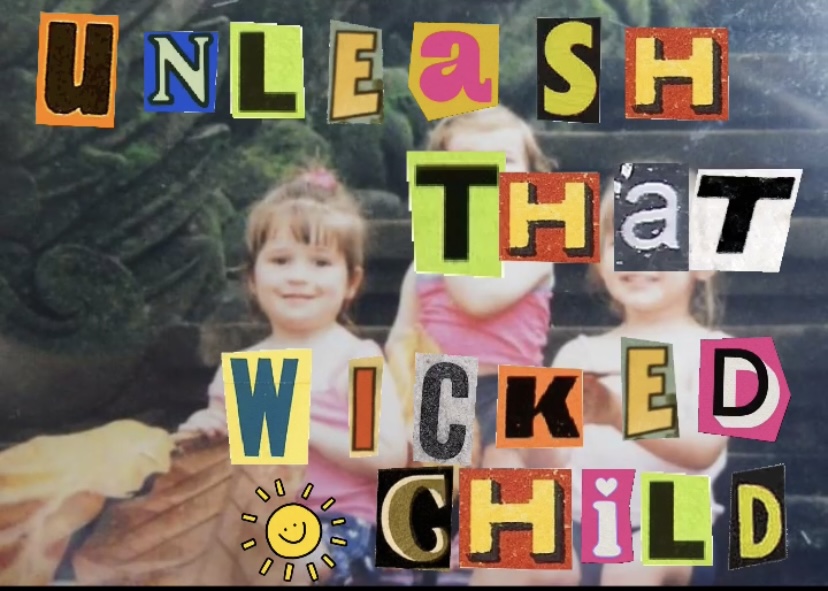
School. Pathways. Decisions about life. I had a cliché fork in the road about which ‘pathway’ (clever name, ‘redacted’ secondary college) to take. Traditional role, become a teacher? A delightful job, entertaining, enthralling, exciting. ‘Moulding the minds of the next generation’, Maths, Science, English. All the learning all the time. Or do I go off the beaten road and find something wickedly creative? Become a writer, an actor, an artist?
I enrolled in primary education at university (I know, but it was the ‘right’ thing to do, I claimed out loud, I can teach and write on the side; of course there would be enough time for that).
It was a lot of fun. It’s insane how quickly you can grow such strong bonds with the groups of children you teach for a short period of time. You learn what their favourite animals are, the way they look at life, who and what they love, (and) you become a small part of their growing lives. I made treasure hunts to teach map reading, puppet shows to read storybooks, math games with prizes to teach multiplication.
My strength is imagination. And yet the wonder from my life started to drain away, enjoyment of the everyday slowly seeping out.
When the fervour for your so-called ‘passions’ start to leak out of you until you are twisted dry of all the zeal of your interests, you escape out the other end afraid of what you once claimed as your favourite things. Fear can control so much; it’s nauseating. That’s when you begin to question whether this path you are beginning to head down is meant for you. It’s a funny thing trying to imagine the rest of your life and realising that you were scared of becoming who you saw at the other end. It was definitely not the person you wanted to be. Quickly, slam the brakes on the car! Turn back!
To halt life for a moment is a scary thing. But sometimes the world needs to stop. It moves way too fast. Days are horrifyingly short. And if time management is not a strong suit of yours, as it is not mine, months can slip away before you get a chance to sit down with that romance book you bought two years ago. It’s such an easy read, and yet, it haunts your every waking moment. You look at it every day and carry it around with you in hopes that your brain will allow you to open it. But it never does. There’s always more important things, or less important, distracting things to do.
I decided, no bullshit.
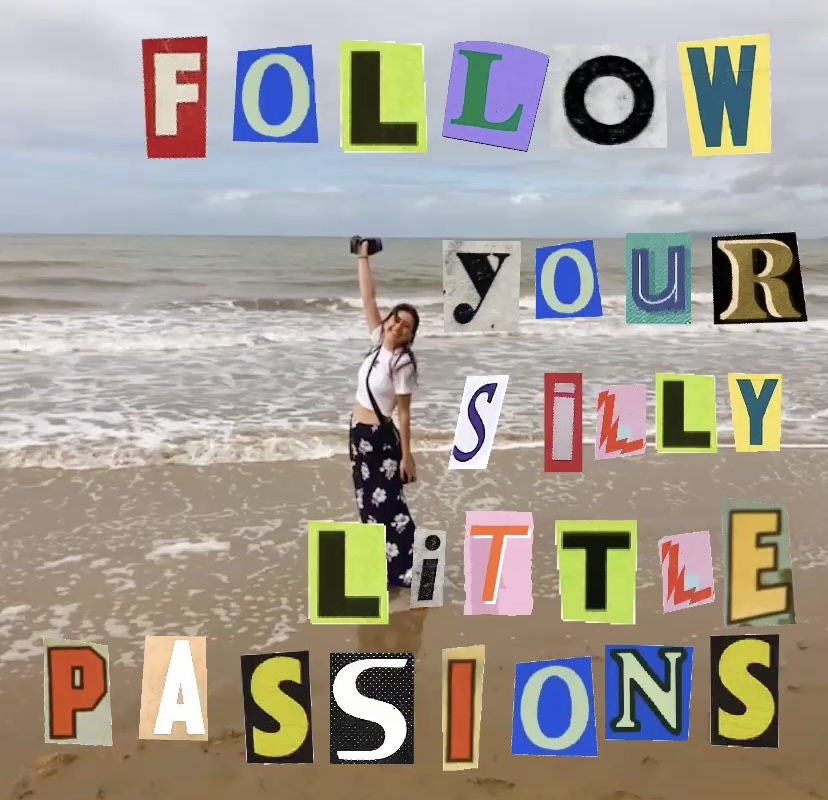
What do I love? Why separate the best things in life and work?
It’s ridiculous and absurdly silly to stray away from the parts of life you love.
And not the good absurdly silly.
And so I changed. Decided to delve into the world of arts. A creative writer, was the person I wanted to be, a trivial girl in an absurd world writing pretty things. Stringing words into beautiful sentences, what a glorious picture. That is, if fear doesn’t strangle the hope out of me first.
The excitement of wandering into class to sculpting clay all day, craft animations, debate philosophy of love and death, emulate Shakespeare, piece together poems of mundane life, everything became crisp. clear. The wild feeling that that is the sum of your life is enchanting. Writing stories was what made me happy.
Discovering passion is strange, for me it was coming to the conclusion that all the things I enjoyed as a child was what I wanted my future to be. Bright, colourful, pretty things. I may need to etch a spot into this world for myself, for a place that doesn’t exist, yet.
It’s nice learning to love the things you once loved. The first time you decide to read again is such a release, and it may be hard to put down a book again. The fear is all still there, but sometimes it can be pushed aside, because there are much scarier things out there and one day picking up a paintbrush, or pen will be easier.
I hate how cliché of a personal discovery this is, but it’s almost, possibly, slightly beautiful that most of us have this realisation at one point.
As infuriating as it might be that we all go through the same life discoveries, we are all living our wonderful, mundane, silly little lives, together, separately.
And I love it.
Don’t waste your life’s purpose worrying about the unchangeable parts of life.
Thrive.
Thanks for everything, Busybird! <3
Lexie Thodis, Friday intern.
From Caregiver to Books
June 13, 2023I grew up in a small country town where the closest Kmart or any sort of big named takeaway was about 30 – 40 minute drive (although I think The Blue Yabby Café was just as good). Public transport? Forget about it; the bus ran from the local post office but only two times a day, either around 8.00 am or 2.00 pm.
What if you miss the bus?
Well bad luck, unless you could beat the bus to the next town, which was a 10-minute drive. After hearing this you may not be surprised to know the school I went to was a Prep to year 12 with less than 100 kids, meaning when I got to Year 12 there was only three other students.
Growing up in this environment led to an extremely active imagination and it also led me to books. Both my parents, my grandma, nana and extended family all loved books and reading. I mainly read romance (you have to remember this was a time of One Direction and Wattpad. I will let you come to your own conclusion) and anything fantasy/supernatural (I have one word, Twighlight ) but I loved reading.
I loved the escape it gave me to live in a world that wasn’t a small country town. I would often sit in front of the fire, back to the heat feeling it slowly warm my whole body, or on my bed under all my blankets, mainly my Taylor Swift one. As I got older, I found less and less time to read and eventually, once I was in Year 12 and working two casual jobs, there just wasn’t enough hours in the day.
Flash forward to the dreaded lockdowns and by this time I had already been a Disability Support Worker for a year. Like most people, I was on Jobkeeper, locked in my house and trying any hobby to occupy me including jigsaw puzzles, relearning piano, embroidery, gaming and, of course, reading.
In the past I had tried to get into reading again but failed. I tried all genres and authors, all different formats, ebooks, physical and audio but nothing sparked the fire that had been dulled from years of misuse. A friend suggested The Night Circus by Erin Morgenstern, and to this day it is a book I would suggest to anyone.
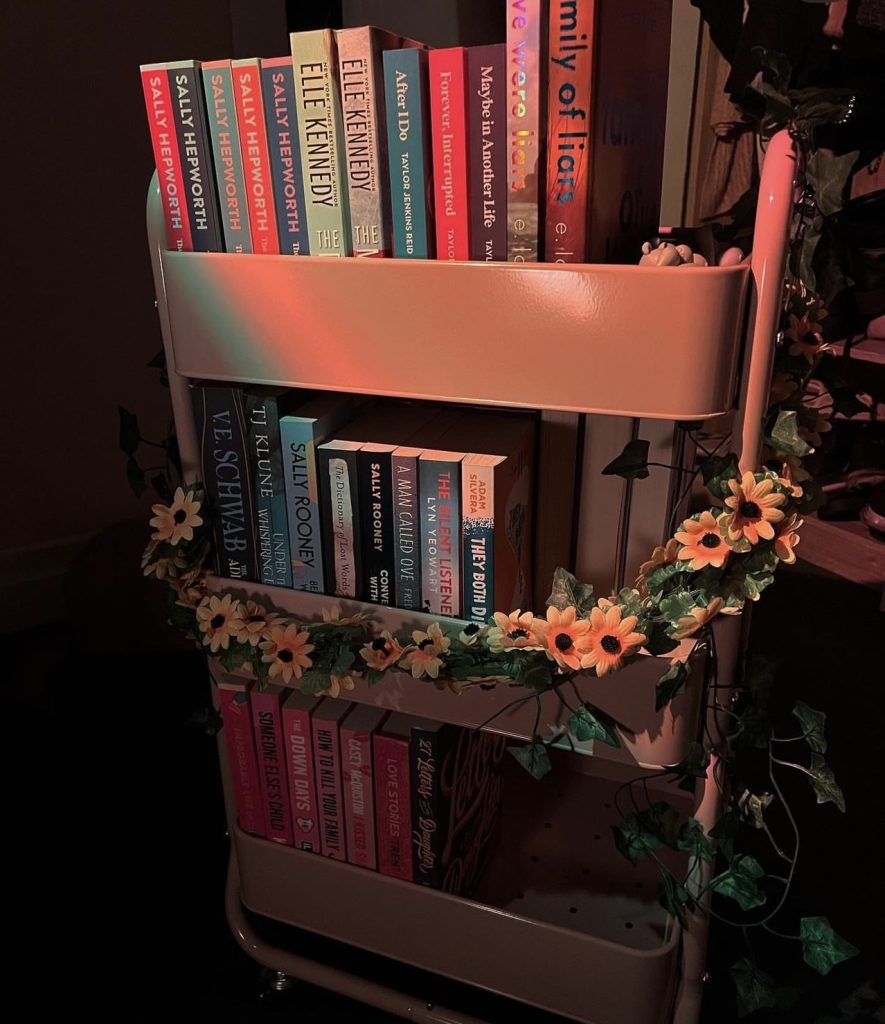
It is a piece that I look up to when attempting to write (when I say attempting, staring at a blank screen counts, right?). This book started a bonfire of passion. I began buying five or more books at a time, reading all day and all night, began buying sticky notes, annotating all my books and now I have three bookcases, a book trolley and a few stacks on the floor.
I decided to change careers and, well, I think we can all guess what the change was to … books. I applied to study Creative Writing, although I planned on still being a Support Worker whilst studying. I applied for a retail job at a bookstore that I saw advertised through a Facebook page, not thinking anything of it, and when I got the phone call, with a lot of apprehension and excitement I said yes. I currently still do some Support Work but my passion is books.
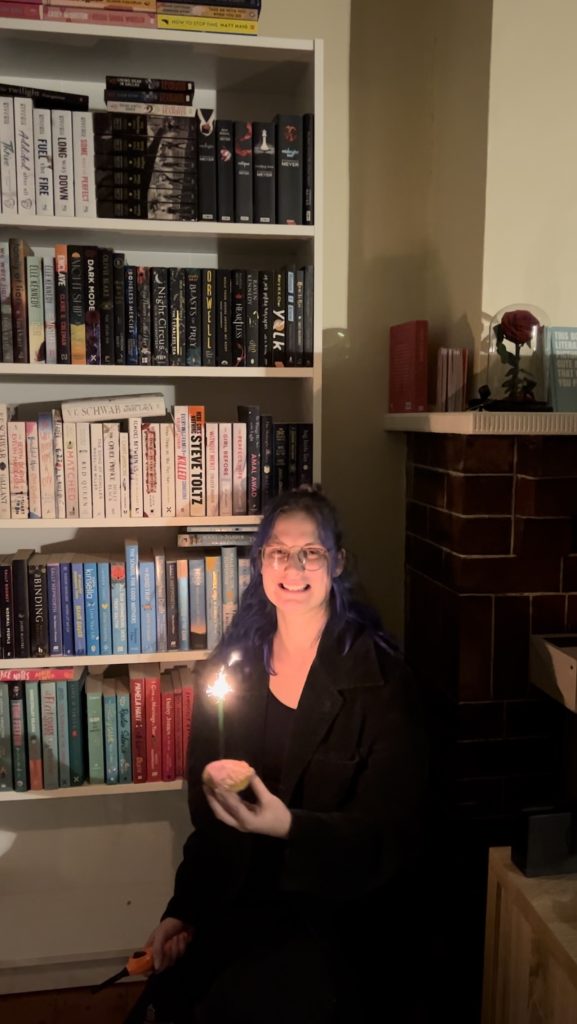
Coming into this field I had no idea what to expect. I had been working in the bookstore for a year and had the amazing opportunity of meeting some lovely authors who have pointed me in the right direction and answered my questions (and trust me I had A LOT). This still did not prepare me for how much effort goes into creating a book, I learnt fast that it takes more than an author to create a book.
This internship has taught me so much about all aspects of creating a book. I have learnt about different programs and have learnt a lot of publishing lingo (like ‘puff’ and yes this is a real word).
This change of career has come with some amazing opportunities, such as this internship but change also always comes with doubts. There’s always doubts whether you are good enough, whether you are editing correctly and following all the rules, or are your designs good enough? They might be, but what if someone did it better? and with the pool of job opportunities in this field not big, doubts can become overwhelming.
But then you see a piece you did for an author on social media and those doubts become muted.
Maggie Kate Turner
Publishing Intern
A Positive Light on Social Media and Books
June 7, 2023How can we utilise it to our advantage
The influence of BookTok and Bookstagram is giving new life to books and book engagement, and as writers and authors it can be daunting trying to grapple not just with trying to create an online presence, but also the time it can take when we feel like we should be writing.
But this blog is going to focus on the positives and opportunities that can be gained from the online book community. First, we can look at some examples. Author Xiran Jay Zhao created an online presence for herself after having trouble publishing her book, not due to the editors, but due to the marketing teams thinking that her genre-bending book wouldn’t sell.
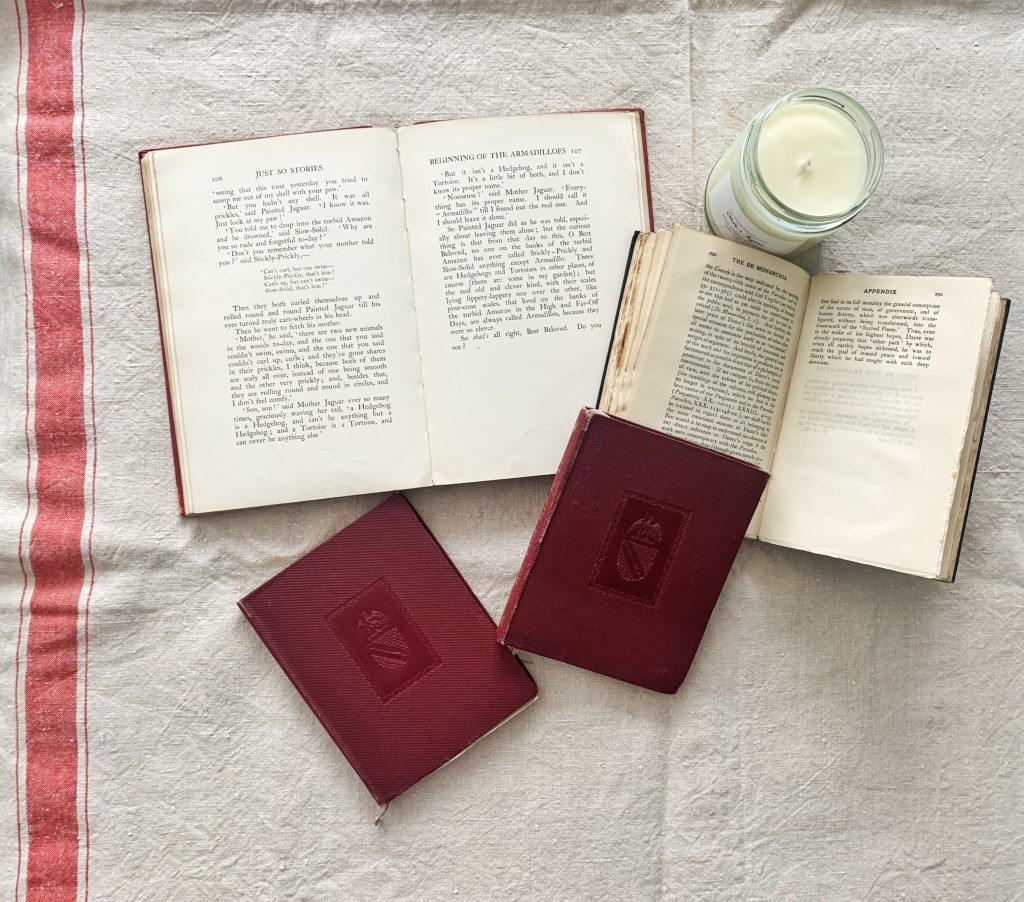
The social media presence she created not only helped more people discover the book, but has become a big part of her success, with over three hundred thousand followers. Her content is a mix of talking about her books and upcoming releases, but also her own personal interest in the French Revolution.
Secondly, we can look at Lloyd Richards and his book which took eleven years to gain success. He wasn’t on TikTok himself, but his daughter posted about his book online and it went viral. As a result it hit No. 1 on the Amazon bestseller list, and has almost 6000 reviews.
Situations like this don’t happen very frequently, particularly on this scale, but it demonstrates the power of social media to get your book out to audiences you might not have previously reached. Furthermore, it demonstrates how much people like to see the author behind the book. This doesn’t mean you have to be filming yourself all the time; even just sharing parts of your day, mentioning interests and hobbies in the captions is all part of audience engagement.
Lastly, we can look at social media influencer Jack Edwards who has a significant online following across Instagram, TikTok and YouTube. He started off creating study content as a university student, but now reviews books and is in the process of writing his first novel. We can look at these successful influencers for inspiration and tips for making our own content.
Jack utilises trends and creates a mixture of long and short form content, including funny anecdotes about his life, book hauls, and uses trending sounds to describe his experiences reading books.
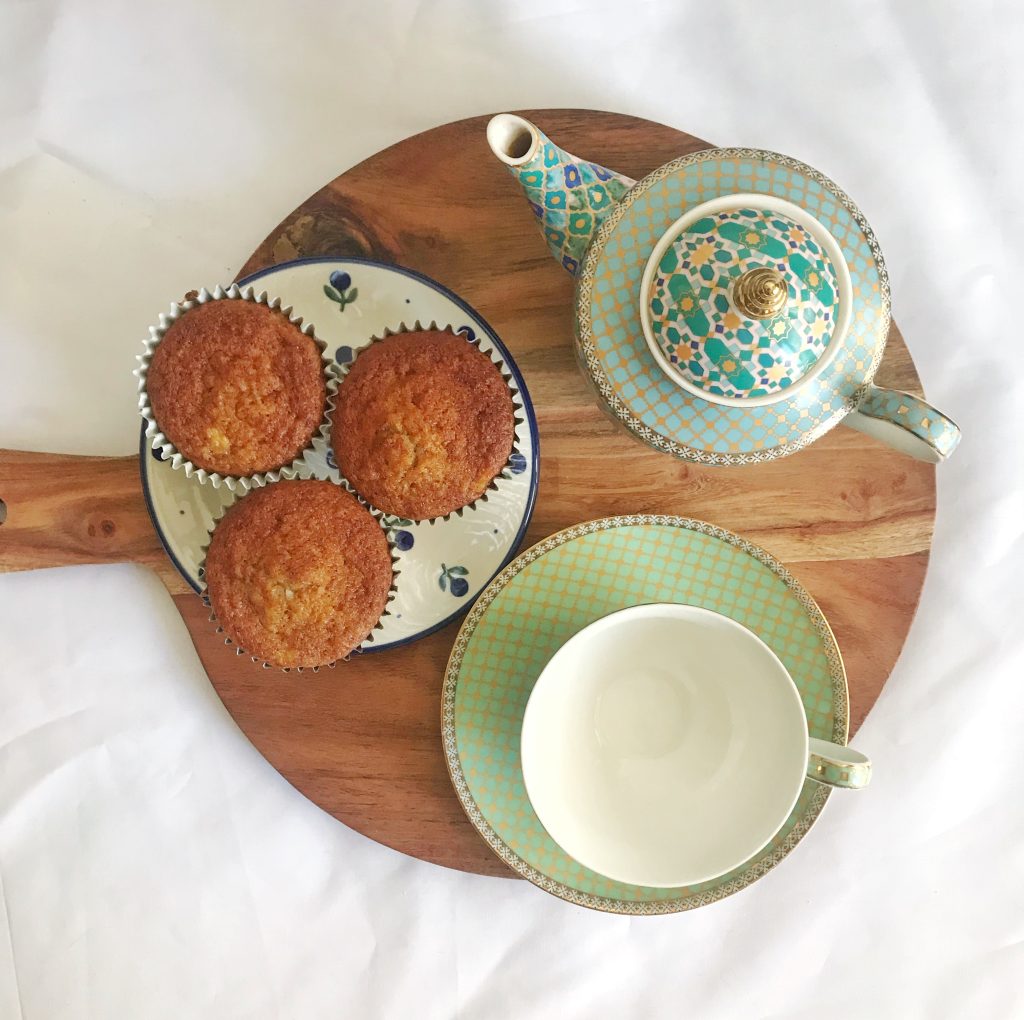
So what might you do for your own content? People like to engage with both the idealised aesthetic of writing (think artistic coffee in cosy cafes, cats as company, and little cottages), but also the realism of writers block, the trials and tribulations of getting rejected by publishers, struggling to meet deadlines and writing goals, and just writing whenever you have to time to do so.
It is important to create content you want to make, and to be consistent. And don’t be afraid of creating content that is similar to other peoples or things you have already made, the algorithm likes patterns! And it makes it easier on us, as we don’t have to create something fresh and new all the time.
Social media may sometimes seem like just another thing we have to do (which isn’t wrong), but we can take advantage of it. Remember the content you create is the content you want to make, whether you want to talk all about writing, focus on the aesthetic, or jump on reading trends as well as writing content. The world of reading and writing is a vast one, and there will be an audience for you.
You just need to find them!
Aislinge Samuel
Editing Intern
Work Experience With Busybird Publishing
May 30, 2023
To all of the wonderful people reading this, working with Busybird Publishing has been one of the most rewarding experiences I could have ever wished for.
After applying to a small publisher for work experience, I was unsure of how my journey would span out.
Once accepted, I was greatly appreciative, yet still uneasy. Was I on the right path? Would I be better off somewhere else? What if I get bored? What if this isn’t the right opportunity to get a glimpse of the writing industry?
Well, I can say I was wrong – at the very least.
Upon walking into the creative atmosphere, I was greeted by a warm, furry smile. Oscar – the beautiful golden Labrador that remained glued to my side throughout the course of my job here. His excitement filled the air, and immediately comforted me.
At least there’s a cute, cuddly dog here, I thought.
But there was so much more.
After meeting my fellow dog companion (that begged me with puppy-dog eyes for a treat), I was welcomed by Kev and Les. Although their smiles were friendly, I was nervous. Still maintaining my previous concerns, and now feeling worried that I would be too inexperienced in an environment like this, Kev and Les assured me that there was no pressure, and that I was welcome to ask any questions that came into my mind.
Usually, when surrounded by adults in a working atmosphere, teenagers such as myself can feel inferior – like they don’t have a say, or are very underestimated. Not once, did I feel this way. Regardless of whether this be because of the childish pranks and dad jokes, or because of the kind souls that this business has, it made the biggest difference.
Jokes and laughter soon filled the air. As I became more and more accustomed to my surroundings, I knew that I could be myself – whether this be with a sarcastic comment or an expression of my “nerd[y]” characteristics, I was free to express my every thought. This is something that has been very important to me throughout my entire life. I love to talk to people, and I love to be myself. In environments that make you suppress that, I’m less than satisfied. This, however, was never the case.
During my short time at Busybird Publishing, I was able to learn more than what I could have imagined. I learnt skills and tips that were required to become an editor and writer, and that your job could be a fun place where you can act freely. To be in constant fits of laughter from all of Kev’s and Les’ jokes was amazing. Witnessing Oscar’s fiendish behaviour was entertaining. Meeting the multiple interns, clients, and other workers who came into Busybird was a blessing. All of these people (including my furry friend) have given me the advice, conversations, and experiences of a lifetime – ones that I will cherish and utilise forever.
Thank you, Busybird. Where chocolates, fake spiders, and music trivia is thrown in your direction, you made me feel like I was working with family. All of my doubts disappeared after one minute. I knew, and felt, that my choice was right. This will be something that I am eternally grateful for. My time shared on every interesting and entertaining story, person or animal was time well-spent. I hope to have the privilege of working with you again in the future.
And by the way, Les, the song playing when I finished this piece was “Edge of Seventeen” by Stevie Nicks. There you go, I played the game.
Thank you,
Leilani
Work Experience
Part Two: The Wednesday Intern
May 25, 2023The following is a recollection of the Wednesday Intern’s experiences. Most of this is true … or at least as true as it needs to be.
Day Five
I created some graphics today. Les needed digital assets for Busybird authors. They’re little images to post on Facebook or Instagram, usually showcasing the book cover, maybe a quote and reviews. They’re an author’s peacock feathers, purely to attract potential readers. Done well, they can be a useful tool.
Anything visual is right up my alley. As much as I love writing a story and editing a story, designing the wrapper it comes in is just as exciting. I learnt all about design in school and know my way around Photoshop. It was fun to match colours and fonts, and play around with layout.
Honestly, I could talk about opacity levels and contrast all day. Point is, I put my all into the graphic I made. Really took my time with it. I was so excited to show the guys. After all my fumbling with signs and devon, I felt I finally found my groove.
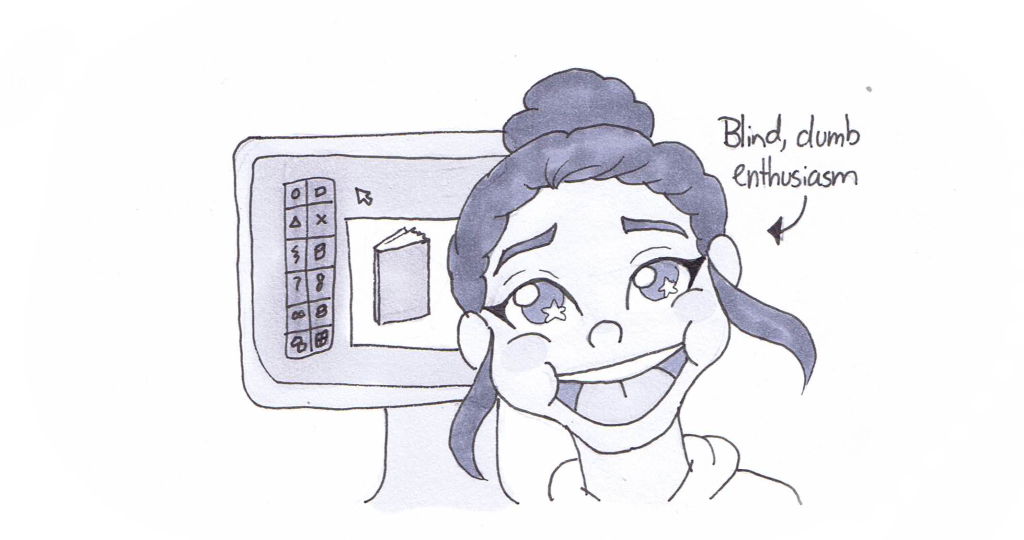
“Sweet,” said Kev, nodding. “Where are the others?”
I forgot the most important rule of Design. Always make multiple. I needed three others. And with only an hour left, I did my best with what I had.
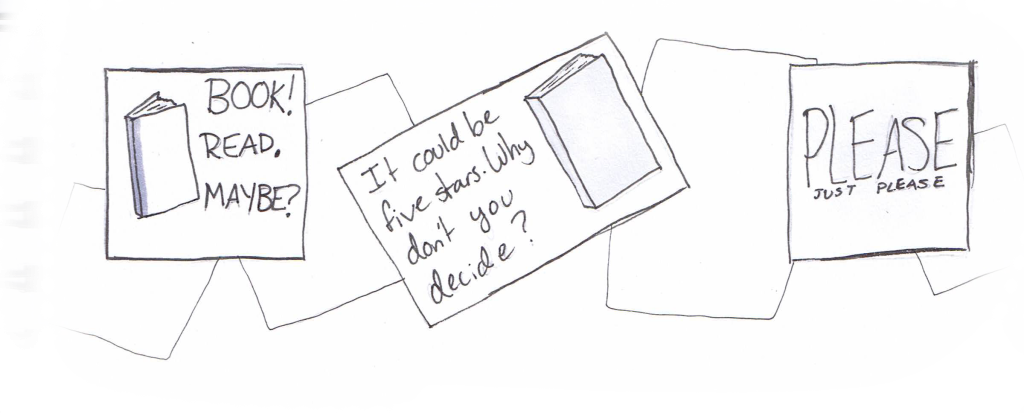
Day Six
I’ve suddenly become really good at guessing songs. It helps that Les is usually in his office and can’t see my computer screen.
“Who sings this, Carly?”
Pause. “Roxette.”
“Excellent!”
“Thanks,” I said, closing out of Google.
It was going great. I think I was becoming their number one intern for a moment there. Until Kev figured it out.
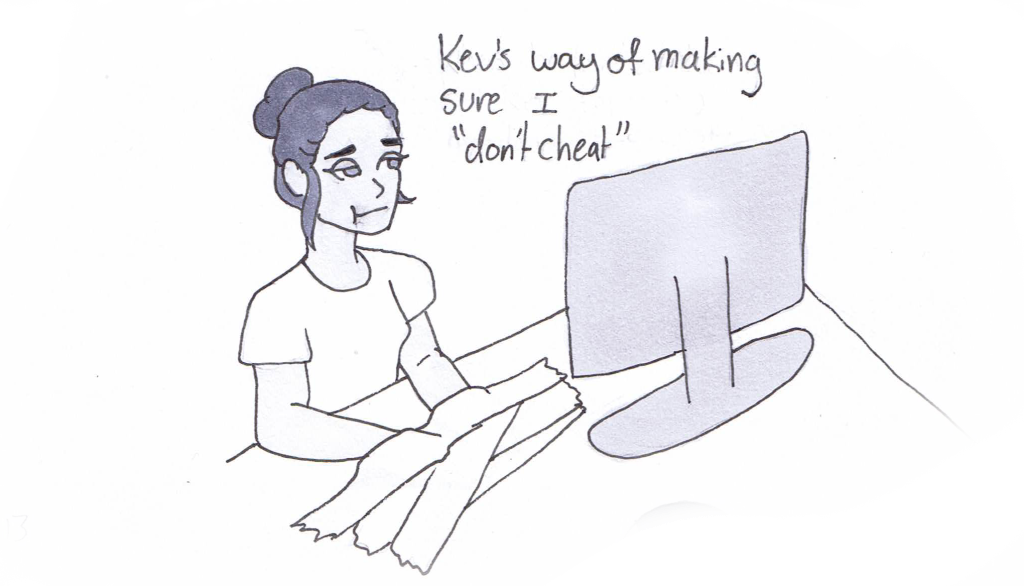
Day Seven
I’m illustrating a book now. For some reason, Kev and Les think I have it in me to produce ten high quality images worthy of being published.
Do I think I have it in me? That’s a hard question to answer.
As artists/writer/creators, we do what we do for fun. Otherwise we wouldn’t do it. No one in their right mind would stare at a blank page for hours on end if they didn’t find something rewarding in it. In that fun, you practice. You get better. You enjoy yourself for a while. Then you see someone else doing it better and suddenly your work becomes the epitome of suck.
And you can try to copy and be inspired by others, but ultimately it doesn’t feel as good, or look like your work anymore. You doubt yourself, your skills and your worth as a creator. Can I actually do this? Will it come out even a tenth as good as I wish it to be? What if I can never get the results I want?
It’s a rollercoaster. Right now, I’m in the big dip. Hopefully in this process, I’ll find that confidence in me that others seem to have. Until then, I’ll work even harder.
And because this got a tad bit sad, here’s a frog using a toadstool as an umbrella.
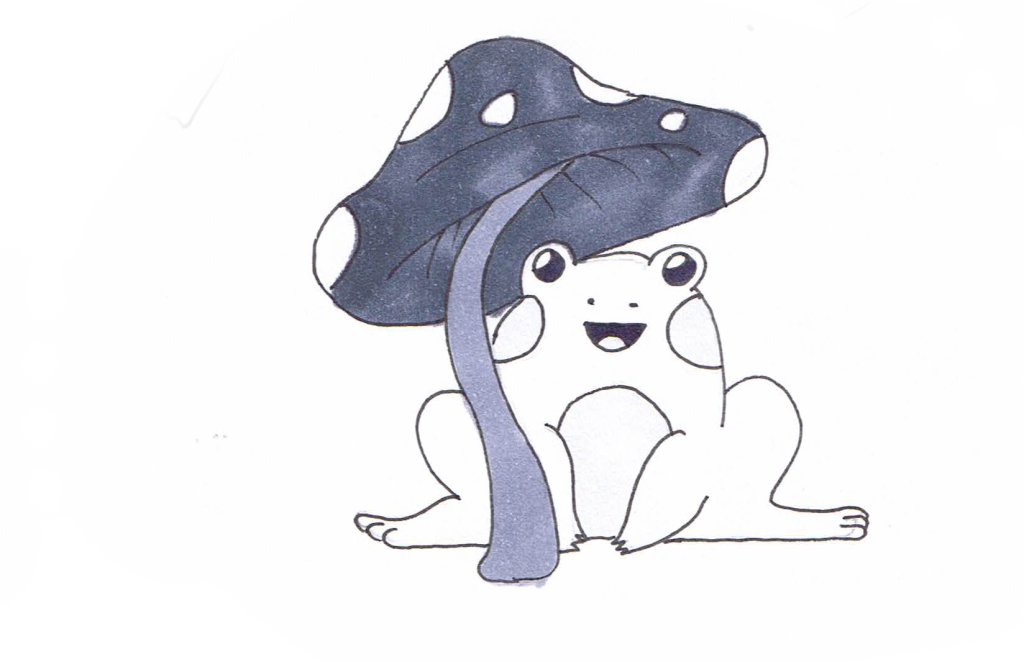
Day Eight
Oscar found a blue-tongue lizard today. We figured it lives under the porch. There’s a few holes where the stairs don’t fit against the earth, and you’d think Oscar would go and stick his nose in to sniff around. Instead, he became a big sook and stuck by me. But that may be because I’ve been feeding him again. Peanut butter on rice cakes yield better results than devon.
After work, we got ready for Open Mic Night. Kev did the sign this time.
Sitting back and watching everyone, something became clear rather quickly. The people presenting their work were just like me. They were nervous to share their material, but also excited. Maybe they didn’t have anywhere else to be a creator. Maybe this was the first community they ever felt like they belonged to. Maybe they, whilst others went out dancing and drinking, spent hours into the night writing. They spent days figuring out that one paragraph that would not flow. They used dish washing time to mull over plot points. They found company in fiction when reality was too harsh of a world to live in.
Introverted. Hardworking. Passionate.
These same people came up to me afterwards with praise, and we spoke about shared experiences as writers and artists. And about this time I realised I was at the halfway point of my internship. My stomach flipped. I’m running out of days.
In another 8 weeks, this is over. No more Oscar crop dusts, no more cringing to guess 80s songs, no more Busybird. If I wanted to stay, I’d probably have to room with the blue tongue.

I’m having a great time and I’m learning so much.
I don’t want it to end.
Carly Mitchell, Publishing Intern
